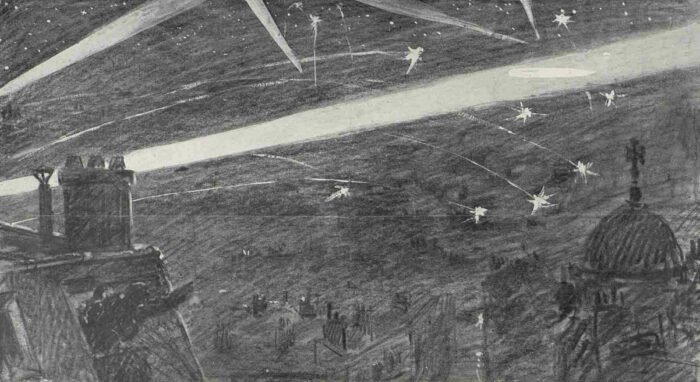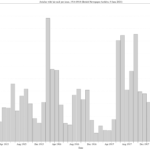
The term ‘air raid’ has been around a long time. Not since the first air raid, or even the first air raid of the twentieth century, but from not long after that. The first definite use in the British Newspaper Archive is in the Sheffield Daily Telegraph, during the 1913 phantom airship panic, as it happens (bold emphases are mine throughout):
The War Office were about to offer a substantial prize for the best aeroplane engine. They had already obtained an anti-airship gun of wonderful efficiency, and progress had been made in solving the problem of defending this country against foreign air raids.1
It was still vanishingly rare, though, and only became popular during the First World War. This happened very quickly. The Dundee Courier (quoting the Daily Express) used ‘air raid’ on 12 August 1914, though clearly more with a sense of reconnaissance rather than bombing:
Daring air raids have revealed all the German positions and movements.2
More obviously in the familiar sense is the next appearance in BNA, in a Western Gazette headline on 28 August 1914 for an attempted Zeppelin attack on Antwerp:
ANOTHER AIR RAID ON ANTWERP
ZEPPELIN REPULSED.
August 26th. IT is officially stated that the Zeppelin airship attempted last night to repeat its raid upon the city. Measures were taken to defeat the attempt, which the Zeppelin then abandoned.3
After this point ‘air raid’ began to be used very widely. (The image above is from the Sphere and shows ‘Shells bursting round a Zeppelin during the air raid on Paris on March 20′.)4
‘Air raid’ soon began being used in compound nouns, many of which are themselves familar from the Second World War. ‘Air raid precautions’ (ARP) always feels very interwarish to me, but it appears surprisingly early in BNA, on 22 January 1915:
COVENTRY & THE WAR.
AIR RAID PRECAUTIONS.
Measures to be Taken.
WARNING CONCERNING GAS SUPPLY.5
By contrast, ‘air raid shelter’ appears quite late, first appearing on 8 June 1917, in the Dover Express (which, given Dover’s location, was very big on air raid precautions):
It might not be possible to erect bomb-proof shelters in our streets, but we do think that in every street where there are buildings which can be expected to give a certain amount of safety to people they should be denoted by a prominent notice, ‘Air Raid Shelter,’ and the doors always kept open for people to get in, and the exact place in the building where the people should go should be definitely settled.6
The phrase ‘air raid warning’ can be found as early as 26 January 1915, in the Yorkshire Post, though it’s not quite a standalone noun yet:
AIR RAID WARNING ARRANGEMENTS AT HULL.
ADVICE TO THE CITIZENS. Arrangements have been made at Hull whereby the military authorities, on receiving sufficient intimation of the approach of air-craft, will able to pass the warning on to the public.7
‘Air raid alarm’ turns up in the Coventry Standard not long afterwards, on 26 February 1915:
AIR-RAID ALARMS.
The arrangemeuts made for giving the inhabitants warning in case of an air-raid by the enemy were discussed at the meeting of the Kenilworth Urban District Council on Tuesday evening.8
‘Air raid siren’ doesn’t appear until 17 August 1916, in the Portsmouth Evening News:
NO AIR RAID SIRENS. Notice has been received by police authorities in the Midlands from the Home Office prohibiting the sounding of sirens or buzzers in the case of air raids between 1½ hours after sunset and 1½ hours before sunrise.9
‘Air raid warden’, the other ‘air raid’ compound noun listed in the OED, doesn’t appear in the BNA until 1936, which you’d expect because that’s about when ARP started being taken seriously (again).
All interesting (?) enough. But why have I called this post ‘The air raid vanishes’? I’ll have to come back to that.
![]() This work is licensed under a Creative Commons Attribution-NonCommercial-NoDerivatives 4.0 International License.
Permissions beyond the scope of this license may be available at http://airminded.org/copyright/.
This work is licensed under a Creative Commons Attribution-NonCommercial-NoDerivatives 4.0 International License.
Permissions beyond the scope of this license may be available at http://airminded.org/copyright/.
- Sheffield Daily Telegraph, 20 March 1913, 7. [↩]
- Courier (Dundee), 12 August 1914, 1. [↩]
- Western Gazette (Yeovil), 28 August 1914, 4. [↩]
- Sphere, 4 April 1915, 8. [↩]
- Midland Daily Telegraph (Coventry), 22 January 1915, 2. A very similar use on the same day appeared in Birmingham Daily Mail, 22 January 1915, 5. [↩]
- Dover Express, 8 June 1917, 2. [↩]
- Yorkshire Post (Leeds), 26 January 1915, 6. [↩]
- Coventry Standard, 26 February 1915, 9. [↩]
- Evening News (Portsmouth), 17 August 1916, 2. [↩]






Pingback: Can Russia Terror Bomb Its Way to Victory in Ukraine? – Flight and Aviation News
Pingback: Can Russia Terror Bomb Its Way to Victory in Ukraine? - Lead Right News